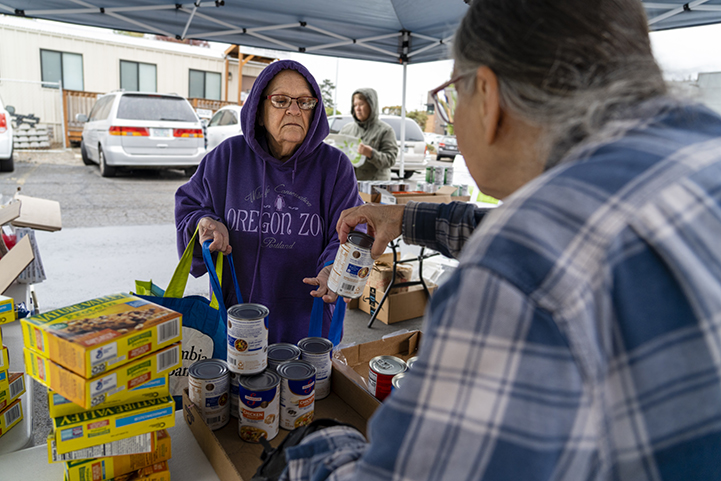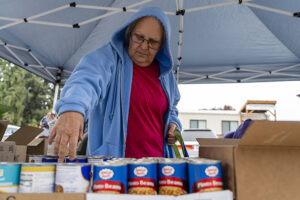Pop-up pantry helps fill service gap

Kathey, left, fills her bag with assistance from volunteer Merri, right, during a pop-up distribution in west Salem.
Last spring, when massive inflation drove up the cost of essentials like food, utilities, and gasoline, many of our neighbors turned to Marion Polk Food Share’s partner pantries for help. Families, seniors, and individuals sought relief from escalating grocery bills more than they had since the peak of the pandemic in 2020.
For the six-month period beginning in March 2022, a pantry at West Salem United Methodist Church served 70% more households than it had for the six months prior.
That’s why, when the pantry was forced to close last summer after the church building was sold, the Food Share worked quickly to ensure our neighbors who relied on it continued to have access to nutritious food.
Shortly after the pantry shut its doors for good, the Food Share began helping fill the need of its clients by opening a pop-up mobile pantry nearby to bridge the service gap and make sure community members in West Salem and surrounding areas didn’t have to go hungry. The mobile pantry is held in a parking lot provided by Food Share partner Northwest Human Services.
Before opening time on a rainy afternoon in the fall, people wait patiently in the rain as Food Share volunteers and staff unload food from a van and set up the shopping area under a large canopy.
Among the volunteers is Merri, who sets up cans of staple items like rice, beans, peanut butter, canned fruits and meats, and shelf-stable milk, as well as fresh produce and frozen chicken. When the pantry opens, she warmly welcomes clients into the shopping area, guides them through the process of “shopping” for food, and ensures they have everything they need.
Merri is passionate about serving her hungry neighbors and is a regular volunteer in the Food Share’s warehouse. When the opportunity arose to help clients at the mobile distribution, she jumped at the chance.
“This is my favorite thing to do,” Merri says. “It makes [me] feel good to help people who are so appreciative.”
Two of the first clients in line are Kathey and Laurie, sisters who both reside in a nearby apartment complex and are living on limited incomes. Kathey is retired, and Laurie is unable to work due to a disability and shares an apartment with her adult son. They are both grateful to have ready access to fresh, healthy food.
“Mentally, physically, it makes us more sound with what’s going on inside our bodies,” Kathey says. “I’m a cancer patient, so it makes a big difference.”
Kathey takes her full bags to the car, then returns to gather more items for an elderly neighbor who is raising her grandchildren. Before they leave, Kathey reflects on how the pantry is helping her family and their neighbors through lean times.
“We are so glad to have this. It helps the community, and it feeds our children,” she says. “It’s helping a lot of people that [would] otherwise slip through the cracks.”


